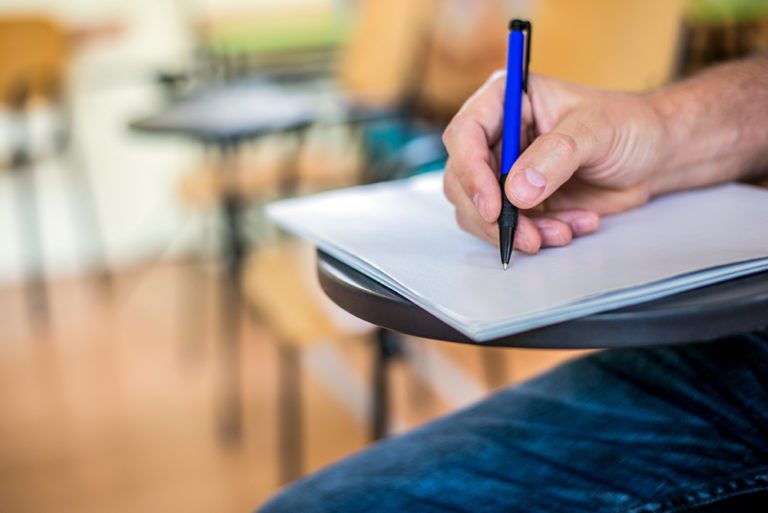Recommendations to Teachers and Students
The following advice is offered to teachers and students preparing for Leaving Certificate Mathematics examinations.
5.1 In advance of the examination
Many of the points below are good habits that should be developed over the course of the students’ studies in mathematics. It is unlikely that candidates will be successful at checking over work effectively, or at performing algebraic manipulations accurately, on the day of the examination if these skills and habits have not been developed over a period of time before the examination.
- Teachers and students should cover the full syllabus. This is of particular importance as there is no choice on any of the examination
- Teachers should use the support material produced by the Project Maths Development Team and the National Council for Curriculum and Assessment. It has been developed specifically to support the kind of learning envisaged in the current mathematics
- Close to the time of examination, questions from past and sample examination papers provided by the State Examinations Commission should be used for practice. However, examination papers should not be relied on excessively during any extended period of learning, as this might unnecessarily restrict the range of student learning and limit candidates’ ability to deal with questions set in unfamiliar
- Students should get into the habit of showing supporting work at all times. This will help them tackle more difficult problems, and will allow them to check back for mistakes in their
- Students should develop strategies for checking their answers. In addition to techniques for identifying that an error has been made, techniques for finding those errors quickly and calmly, including getting to know one’s own weaknesses, should also be
- Teachers should provide frequent opportunities for students to gain comfort and accuracy in the basic skills of computation, algebraic manipulation, and calculus. Students should be particularly careful with signs, powers, and the order of operations. When the basic skills are being attended to properly it is much easier to engage also with context-based questions.
- Students should always round their answers to the required level of accuracy, and include the appropriate unit where relevant. These are skills that are not conceptually challenging, and they should be developed to a high standard through regular
- Students should get used to describing, explaining, justifying, giving examples, etc. These are skills that are worth practising, as they will improve understanding, as well as being skills that may be directly assessed in the examination. Students do not need to be able to reproduce learned off statements of results or definitions, but they do need to be able to state or explain these reasonably
- Students should make sure that they have geometric instruments and should practise using them accurately. In particular, students should be familiar with the various ‘centres’ of a triangle and be able to construct them, as appropriate to the syllabus at the level
- Teachers should provide opportunities for students to apply the skills and knowledge from one strand to material from another strand. Mathematics is not a list of discrete rules and definitions to be learned but rather a series of interconnected principles that can be understood and then applied in a wide variety of contexts. While compartmentalising knowledge may help keep it organised, it will restrict the ability to cope with unfamiliar questions, particularly those requiring the synthesis of knowledge and skills from several strands.
- Students should practise different ways of solving problems; building up their arsenal of techniques on familiar problems will help them to tackle unfamiliar ones. Students at Higher level and Ordinary level should pay particular attention to algebraic methods of solving problems, as such methods are directly examinable at these
- Teachers should provide students with opportunities to practise solving problems involving real-life applications of mathematics, and to get used to dealing with “messy data” in such problems. Students should also be encouraged to construct algebraic expressions or equations to model these situations, and / or to draw diagrams to represent
- Teachers should provide students with opportunities to solve unfamiliar problems and to develop strategies to deal with questions for which a productive approach is not immediately apparent. Students should be encouraged to persevere in these types of question – if the initial attempt does not work, they should be prepared to try the question a different
- Students should have a good knowledge of the information available in the Formulae and Tables booklet, and the location of relevant material within the booklet.
5.2 During the examination
- Candidates should attempt all of the questions the examination
- Candidates should read each question carefully, paying particular attention to key They should also examine carefully any diagram that is provided.
- Candidates should make sure that they answer the exact question asked, and give the answer in the required form with the appropriate unit. Many candidates fail to do
- The question often contains clues regarding the nature of the answer. For instance, if it asks to find the value of x, there should only be one answer, while if it asks to find the values of x, one might expect more than one. Similarly, attention should be paid to whether the question indicates that the answer a natural number, integer, real number,
- Candidates should concentrate when answering, as careless errors will result in marks being needlessly lost. Errors can also disadvantage candidates as they can make the work that follows more difficult. Further, in the event that an error in a particular section oversimplifies follow-on work in a subsequent section, then marks will be lost in that following section as
- Candidates should present their work as neatly and tidily as possible. This will help when checking back over it, and will help the examiner to find relevant work for which marks can be
- Candidates should show all of their work. In some questions, full marks will not be awarded unless candidates show supporting work. Furthermore, marks are generally not awarded for an incorrect answer without any supporting work, whereas if candidates show a procedure which would lead to a solution, then they may get credit for
- If possible, candidates should have an estimate of the answer in advance. They should check that the answer makes sense, including the appropriate unit – if it does not, they should review their
- In many topics, including coordinate geometry and trigonometry, drawing sketches or diagrams may aid candidate in understanding how to solve the problem.
- In instances where graphing or a co-ordinate geometry diagram is required, take care when drawing these. Use a ruler and compass and scale correctly (if the scale is not given),
- Plot points carefully, and understand when to join points in a straight line and when a smooth freehand curve is
- When candidates believe that they have made a mistake, it is often most beneficial to start They should draw a single line through the incorrect work. They should not use corrector fluid or otherwise make the work illegible – if there is valid work presented and still visible, it may be awarded some marks.
- Candidates should avoid trying to force the correct answer when this is given in the question. They should instead state their conclusions based on their own
- Candidates should be prepared for the unexpected. The syllabus states that they should be able to solve problems in familiar and unfamiliar contexts, so the examination paper would not be fit for purpose if the candidates recognised everything on it. Candidates should expect that there will be questions on the examination paper that, at first glance, they will not know how to complete. They should stay calm, and use the problem-solving skills that they have developed throughout their studies. The less familiar the territory, the more credit is likely to be awarded for attempts at applying appropriate strategies. It is always advisable to make an attempt at these
- Candidates should use all of the time in the examination. lf they finish the examination paper early, they should review their work, checking as many answers as

